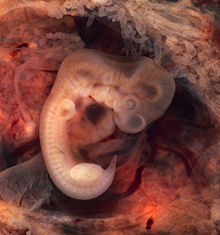
Back تأسل Arabic Atavizm Azerbaijani Атавізм Byelorussian Atavizam BS دەرکەوتنەوەی خەسڵەتەکان CKB Atavismus Czech Atavismus German Αταβισμός Greek Atavismo Spanish Atavism Estonian
This article possibly contains original research. (May 2023) |

In biology, an atavism is a modification of a biological structure whereby an ancestral genetic trait reappears after having been lost through evolutionary change in previous generations.[3] Atavisms can occur in several ways,[4] one of which is when genes for previously existing phenotypic features are preserved in DNA, and these become expressed through a mutation that either knocks out the dominant genes for the new traits or makes the old traits dominate the new one.[3] A number of traits can vary as a result of shortening of the fetal development of a trait (neoteny) or by prolongation of the same. In such a case, a shift in the time a trait is allowed to develop before it is fixed can bring forth an ancestral phenotype.[5] Atavisms are often seen as evidence of evolution.[6]
In social sciences, atavism is the tendency of reversion. For example, people in the modern era reverting to the ways of thinking and acting of a former time.
The word atavism is derived from the Latin atavus—a great-great-great-grandfather or, more generally, an ancestor.
- ^ Uthman, Ed (2014). "Tubal pregnancy with embryo". WikiJournal of Medicine. 1 (2). doi:10.15347/wjm/2014.007.
- ^ "Multi-cell Organisms". Universe-review.ca. Retrieved 2011-09-29.
- ^ a b Brian K. Hall (1984), "Developmental mechanisms underlying the atavisms", Biological Reviews, 59 (1): 89–124, doi:10.1111/j.1469-185x.1984.tb00402.x, PMID 6367843, S2CID 29258934
- ^ Tomic, Nenad; Meyer-Rochow, Victor Benno (2011). "Atavisms - medical, genetic, and evolutionary implications". Perspectives in Biology and Medicine. 54 (3): 332–353. doi:10.1353/pbm.2011.0034. PMID 21857125. S2CID 40851098.
- ^ Held, L. (2009). Quirks of Human Anatomy, an Evo-Devo Look at the Human Body. Cambridge University Press. ISBN 978-0-521-73233-8.
- ^ Cite error: The named reference
Briankhall2was invoked but never defined (see the help page).
© MMXXIII Rich X Search. We shall prevail. All rights reserved. Rich X Search